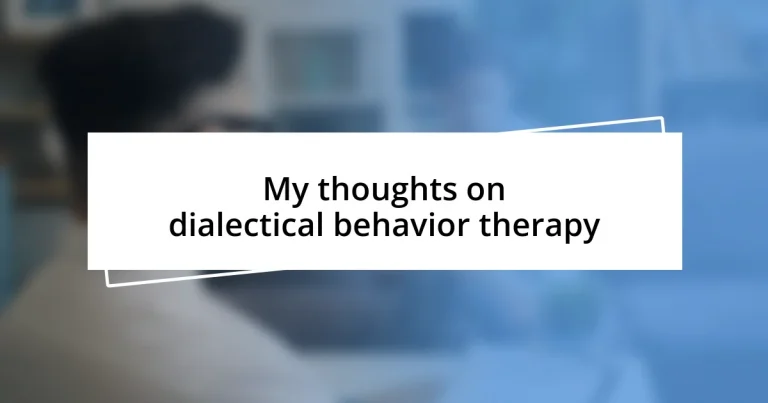Key takeaways:
- Dialectical Behavior Therapy (DBT) integrates acceptance and change, focusing on mindfulness, emotion regulation, distress tolerance, and interpersonal effectiveness to help individuals manage intense emotions.
- Notable benefits of DBT include improved emotional regulation, enhanced communication skills, greater self-acceptance, and increased resilience, leading to healthier relationships and personal growth.
- Practical techniques such as “Wise Mind,” “Distress Tolerance” skills, and “Behavioral Chain Analysis” are essential for implementing DBT strategies and navigating emotional challenges effectively.
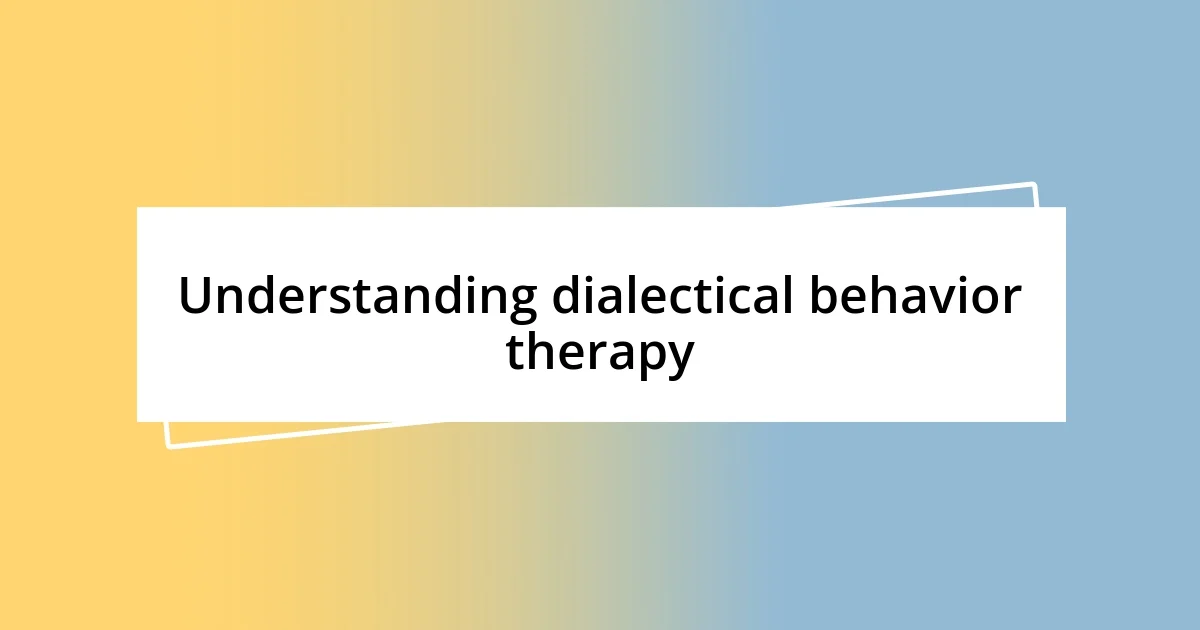
Understanding dialectical behavior therapy
Dialectical Behavior Therapy (DBT) is a unique and multifaceted approach to mental health, primarily designed to help individuals with emotional regulation. I remember the first time I encountered DBT in a workshop; it struck me how it blends both acceptance and change, offering a practical framework for those grappling with intense emotions. Isn’t it fascinating how the concept of dialectics—embracing opposites—can lead to personal transformation?
The core of DBT revolves around four key components: mindfulness, distress tolerance, emotion regulation, and interpersonal effectiveness. I often find myself reflecting on how mindfulness, in particular, can bring such clarity during turbulent times; it’s like switching on a light in a dark room. When you think about it, isn’t that what we all crave in moments of crisis—the ability to pause and truly observe our thoughts and feelings without judgment?
In my experience, the emphasis on building skills through DBT stands out as both practical and profound. I recall a friend who used DBT skills to navigate a particularly rough patch; it was inspiring to see how she learned to apply distress tolerance strategies during overwhelming moments. Have you ever wondered how acquiring these skills could change the way we approach our own emotional challenges? It opens a door to a more balanced life, where emotional upheavals don’t control us but, instead, invite us to grow.
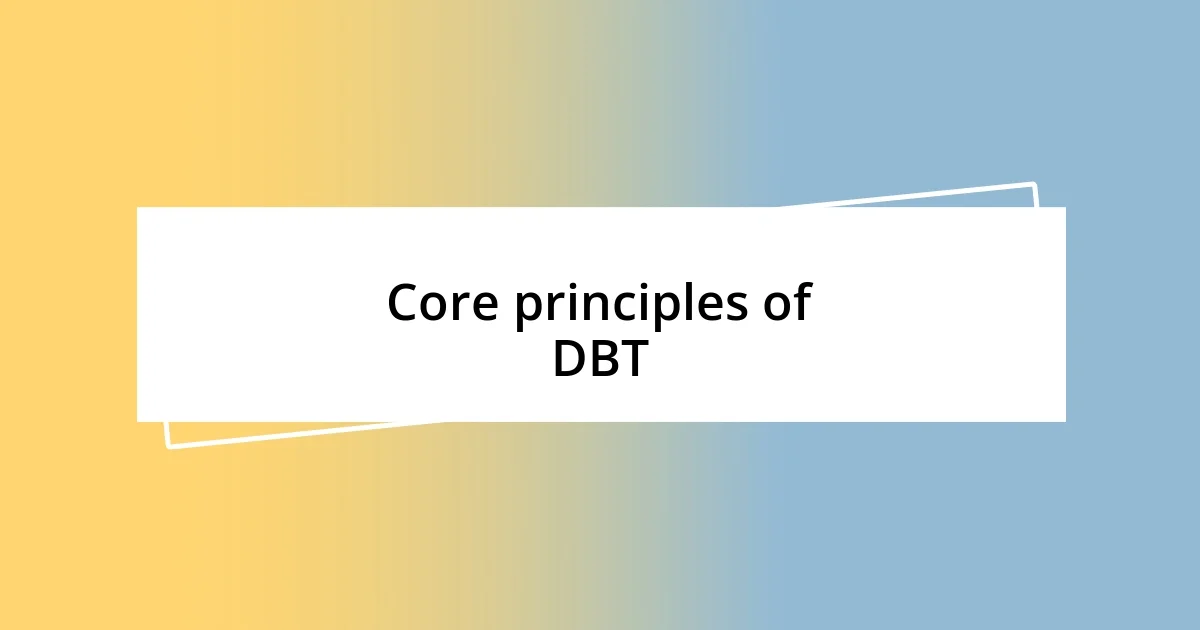
Core principles of DBT
The core principles of Dialectical Behavior Therapy (DBT) center on the balance between acceptance and change. Mindfulness is the foundation, allowing individuals to stay present and aware of their thoughts and feelings without judgment. I once experimented with mindfulness techniques during a particularly stressful period, and it was remarkable how simply being aware of my breath helped ground me amidst chaos. It made me realize that this practice doesn’t just benefit those in therapy; it’s a life skill that everyone can cultivate.
Emotion regulation is another crucial aspect, enabling individuals to understand and manage their emotions effectively. I think back to a time when I felt overwhelmed by sadness; learning to identify my emotional triggers through DBT really helped me navigate those turbulent waters. By understanding what caused my feelings, I was empowered to respond more thoughtfully, rather than react impulsively. This aspect of DBT provides tools that can transform one’s relationship with their emotions, creating space for healthier responses.
Lastly, interpersonal effectiveness in DBT equips individuals with the skills to communicate and interact with others more constructively. I’ve seen these skills in action with a family member who struggled to express their needs. Through DBT, they learned to articulate their feelings and establish boundaries, transforming personal relationships. It’s inspirational to witness someone grow more confident in their interactions, isn’t it? These fundamental principles not only serve as a roadmap for therapy but also lay a foundation for lasting personal growth and connection.
| Core Principle | Description |
|---|---|
| Mindfulness | Staying present and aware of thoughts/feelings without judgment. |
| Emotion Regulation | Understanding and managing emotions effectively to avoid impulsive reactions. |
| Interpersonal Effectiveness | Skills for constructive communication and relationship-building. |
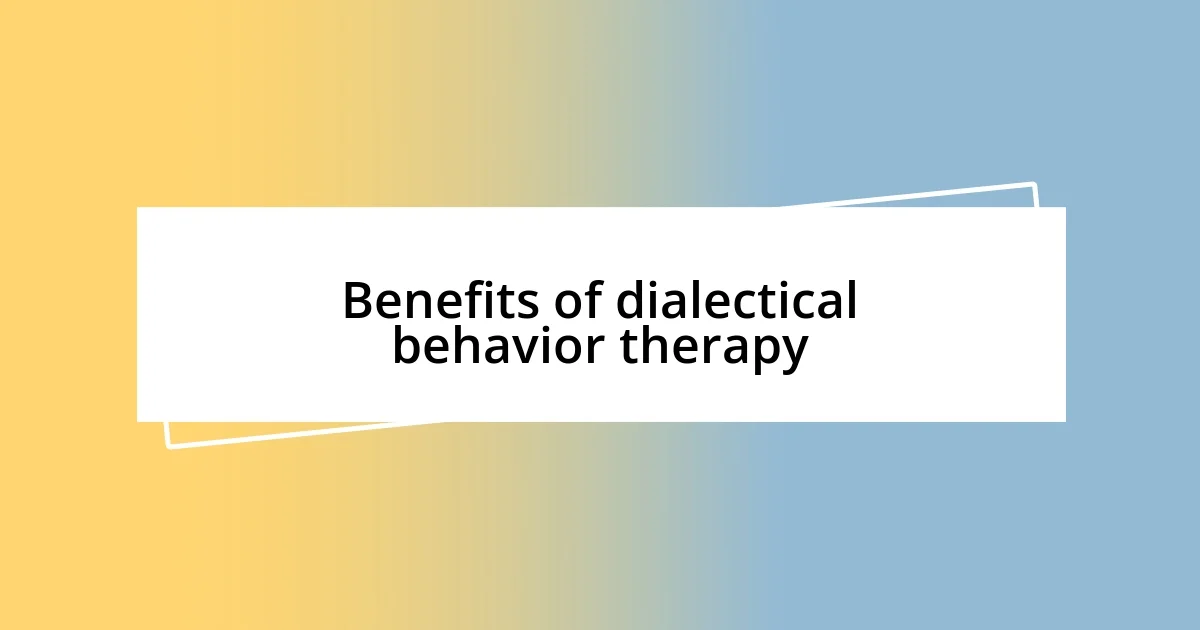
Benefits of dialectical behavior therapy
The benefits of dialectical behavior therapy (DBT) are truly transformative. I remember when I first observed the change in a client who had struggled with anger outbursts. After engaging with DBT, they developed a deeper understanding of their emotions and learned to articulate them calmly. It wasn’t just about managing anger; it was about building bridges instead of burning them.
Here are some of the key benefits that I’ve seen:
- Improved Emotional Regulation: Many individuals learn how to navigate their emotions without feeling overwhelmed. For example, practicing emotion regulation helped a neighbor of mine make sense of her anxiety, allowing her to approach social situations with more confidence.
- Enhanced Communication Skills: DBT empowers people to express themselves more effectively. One close friend, who was once often misunderstood, found clarity in his thoughts and feelings, leading to richer, more meaningful conversations.
- Greater Self-Acceptance: I’ve witnessed clients embrace their imperfections, which fosters self-compassion. This journey can be heartwarming to observe, as individuals begin to appreciate their uniqueness rather than focusing on perceived flaws.
- Increased Resilience: Through the skills learned in DBT, many find that they can handle life’s challenges more skillfully. A mentee of mine used to crumble under stress, but now approaches problems with a newfound perspective that allows for growth.
Engaging with DBT offers more than skills; it invites a deeper understanding of oneself and fosters healthier relationships with others.
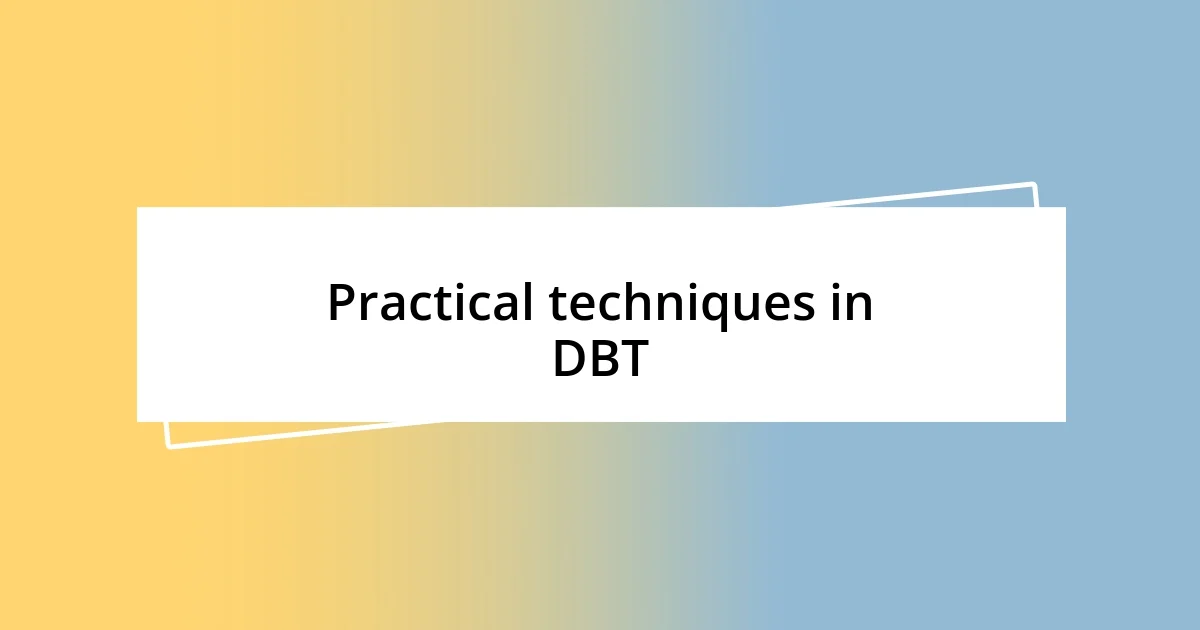
Practical techniques in DBT
When diving into practical techniques of DBT, one that stands out for me is the “Wise Mind” skill. This involves finding a balance between emotional and rational thoughts. I remember feeling torn between my gut feelings and the logical advice from friends. Learning to access my wise mind allowed me to navigate decisions more thoughtfully, helping me feel more centered. Have you ever felt a similar struggle? Tapping into this technique can lead to better decision-making and a sense of inner peace.
Another key technique in DBT is the use of “Distress Tolerance” skills. I encountered this firsthand during a particularly challenging period when emotions seemed overwhelming. Techniques like the “TIPP” method—Temperature, Intense Exercise, Paced Breathing, and Paired Muscle Relaxation—helped me manage my acute stress in the moment. Just a splash of cold water on my face or a quick burst of physical activity made a world of difference. It’s fascinating how simple actions can disrupt an emotional spiral, isn’t it?
Finally, the “CHECK the FACTS” technique plays a pivotal role in combating cognitive distortions. When I used to leap to conclusions, I found myself trapped in anxiety. By methodically evaluating my assumptions against reality, I learned to question those exaggerated fears. This technique rewarded me with clarity and often brought me back to stability. I encourage anyone exploring DBT to give this technique a try; it might just reshape how you see your daily challenges.
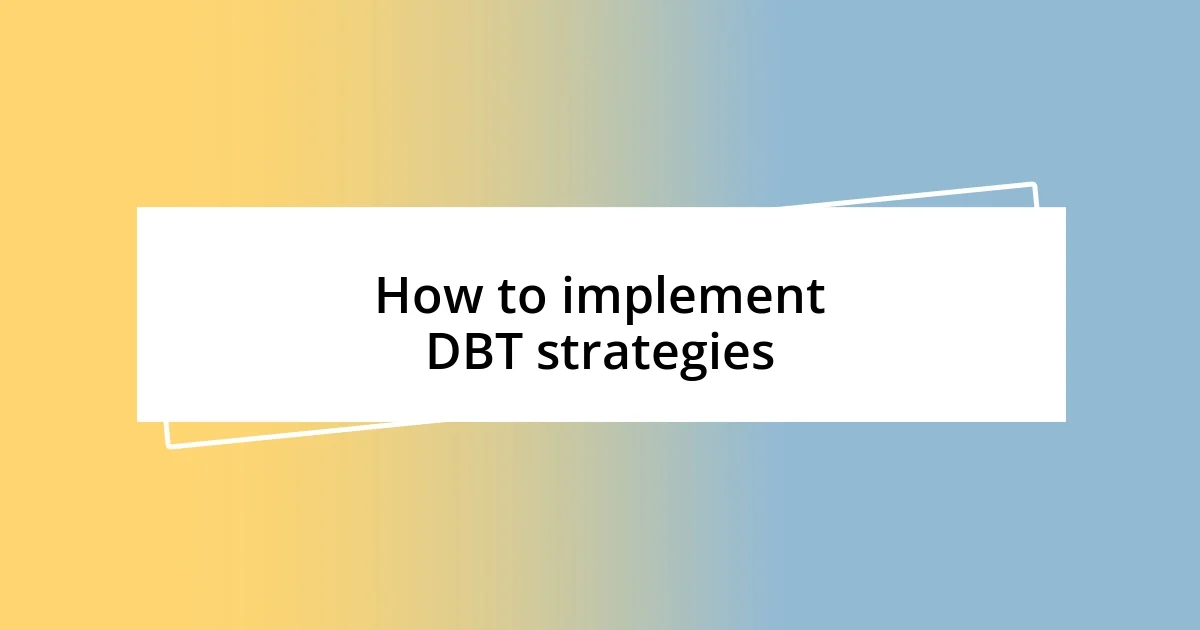
How to implement DBT strategies
Implementing DBT strategies can feel like embarking on a personal journey toward emotional mastery. One of my favorite approaches is the use of “Mindfulness.” For instance, I remember a time when I was overwhelmed with racing thoughts during a stressful day at work. By just pausing and focusing on my breath, I could anchor myself in the present moment. This simple act shifted my entire perspective, allowing me to tackle tasks with clarity and composure. Have you ever noticed how a few deep breaths can radically change your state of mind?
Another effective strategy is the “Behavioral Chain Analysis,” which helps identify triggers and the sequence of events leading to emotional reactions. I once guided a friend through this process after she experienced an emotional outburst. By breaking down her reactions step-by-step, we realized how one minor inconvenience escalated into a meltdown. This realization was enlightening for her, as it highlighted the importance of recognizing patterns in behavior before they spiral out of control.
Lastly, setting “SMART Goals” can significantly enhance your DBT practice. When I set specific, measurable, achievable, relevant, and time-bound goals, it felt like I was putting the pieces of my life puzzle together. For example, I aimed to practice my emotion regulation skills daily for a month. Achieving small milestones boosted my confidence and made the journey feel rewarding. Have you thought about what goals you could set to enhance your emotional growth? By reflecting on these personal aspirations, we can turn abstract skills into tangible, life-changing actions.
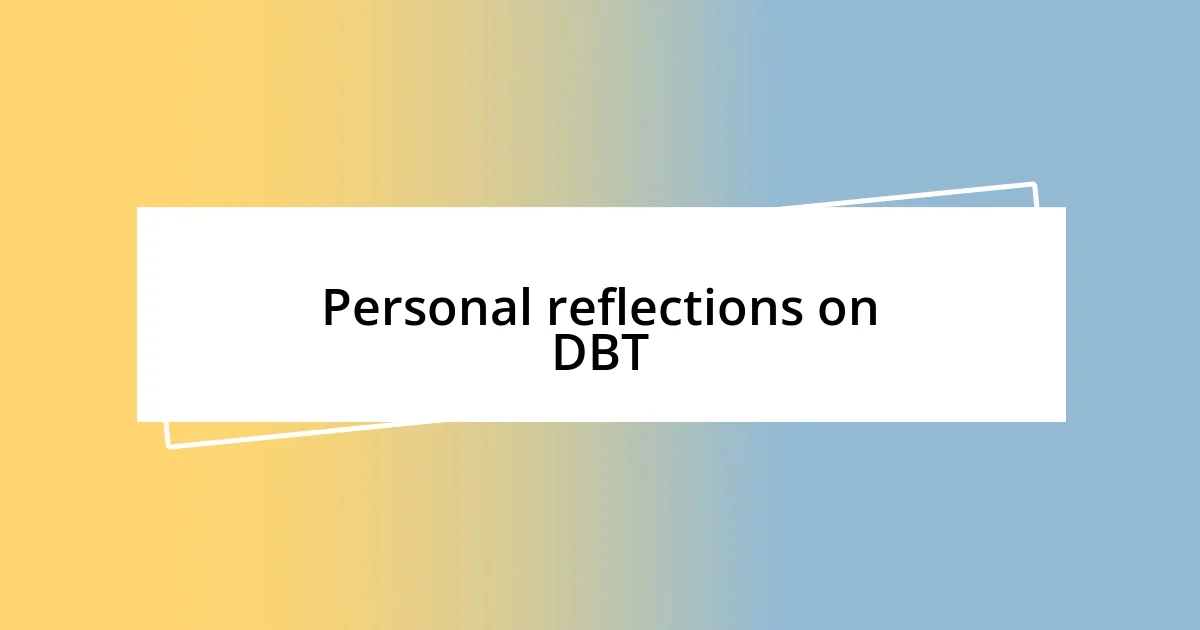
Personal reflections on DBT
Reflecting on my journey with DBT, one memory instantly comes to mind: my first experience practicing “Radical Acceptance.” There was a time when I struggled to accept a setback in my life that felt insurmountable. As I began to embrace this principle, I discovered a sense of release. It was surprising to me how letting go of the resistance allowed me to shift my focus to what I could control. Have you ever noticed how acceptance can act like a powerful step towards healing?
DBT’s emphasis on personal responsibility resonated deeply with me. I recall having a conversation with a loved one about an emotionally charged situation we’d been navigating. Instead of pointing fingers, DBT taught me to own my role in the dynamics. This approach shifted my perspective, fostering empathy and understanding. The realization that my reactions held power—and were changeable—gave me a newfound sense of agency. Isn’t it empowering when we recognize that we can influence our emotional landscapes?
Another poignant reflection comes from my practice of “Interpersonal Effectiveness.” I vividly remember a tense negotiation at work when I used these skills to express my needs firmly and respectfully. The outcome surprised me: not only did I achieve my goals, but I also cultivated stronger relationships with my colleagues. It was a clear illustration of how effective communication can create a bridge rather than a barrier. Have you experienced the benefits of being assertive in your interactions? DBT truly transformed how I navigate my social world.
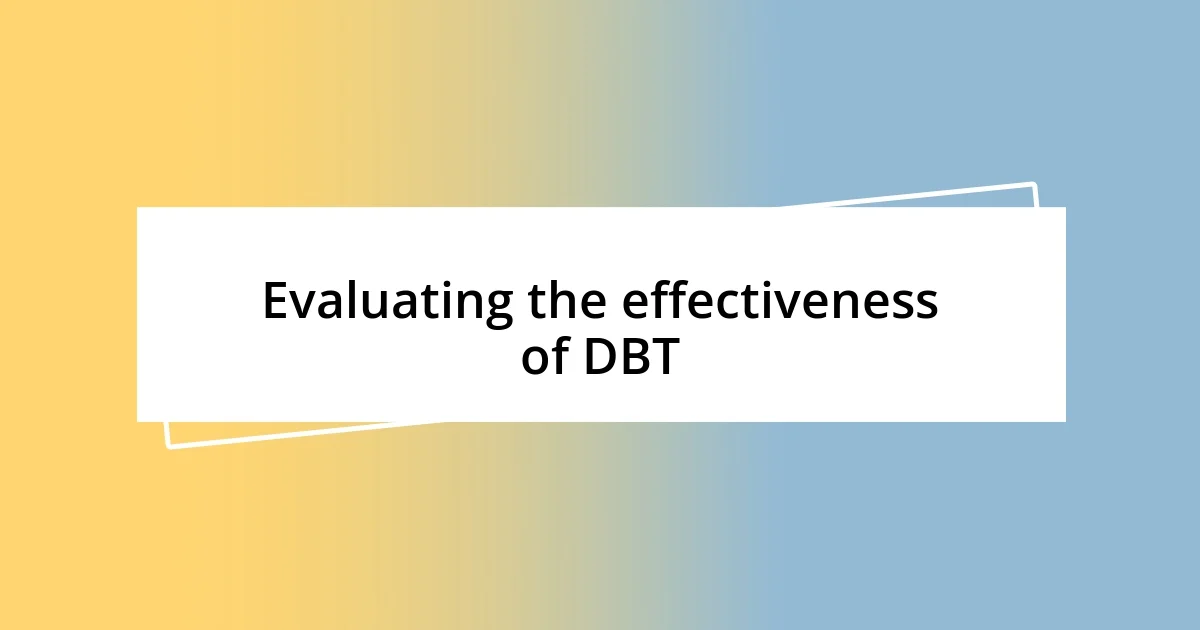
Evaluating the effectiveness of DBT
The effectiveness of Dialectical Behavior Therapy (DBT) is often reflected in its structured approach to improving emotional regulation. I recall a friend who struggled with intense emotional swings. After completing a DBT program, she shared that not only did her episodes become less frequent, but her ability to manage stress also improved significantly. That’s a testament to how targeted skills can make a profound difference.
In another instance, I had a colleague who used DBT principles to cope with anxiety related to public speaking. She confessed that, although the fear was still present, her newfound mindfulness skills helped her ground herself before presentations. It’s fascinating how DBT provides real tools to address specific challenges, transforming a seemingly daunting experience into a manageable one.
Moreover, research shows that DBT is especially effective for individuals struggling with borderline personality disorder and chronic suicidal ideation. I remember reading anecdotal reports from people who found not just stability but also a renewed sense of purpose in their lives. Isn’t it inspiring to think that a therapeutic approach can help someone find meaning, even amidst chaos? This speaks volumes to the positive impact DBT can have on mental health.












